2021 Annual Aortic Bridge Walk Goes the Extra Mile to Save Lives
September 18 event empowers patients and doctors to reduce aortic disease fatalities with a simple message: know and share your family medical history.
“Aortic Bridge is a resource for patients and families’ with a diagnosis of aortic disease.” says Dr. Youdelman. “In addition to offering support groups and education for our 145 active members, we are part of the collaborative effort that is THINK AORTA and take their messaging on as our primary goal. Awareness of family medical history has been shown to increase early detection, but there is much work to be done to educate the public and health care professionals about these issues.”
The work is well worth doing. Aortic disease can manifest as an enlargement, called and aneurysm, or a tear in the wall called a dissection. Both can lead to a rupture of the aorta and sudden death. Aortic dissection is the painful extreme and is the one most likely to send patients for emergency treatment. Unfortunately missed diagnosis can lead to delays of treatment with poor outcomes. As such, there is no question “thinking” aorta will save lives.
The THINK AORTA initiative started in doctor’s offices and the emergency department with education and tangible reminders in the form of posters and pamphlets. “While the medical community does need to change their approach to aortic disease, patients also need to be informed of their role.” Dr. Youdelman explains. “It’s about more than understanding the record of heart disease in one’s family. Knowing your family history of cancer, stroke, diabetes, heart disease and aortic disease will help your doctors to reduce your risks. We now know that there are many conditions in the body controlled by genes given to you by your parents that are directly linked to aortic disease. Patients need to learn and report their complete family medical history, and practitioners need to act on it.”
For his part, Dr. Youdelman walks the walk. He founded Aortic Bridge and joined the International THINK AORTA’s US board in 2019. While COVID slowed down their marketing efforts and outreach plans, he spent hundreds of hours pouring over CT scans at his own facility and is currently preparing what he found for publication which suggests that aortic aneurysms may be much more common than we previously thought. While it’s too soon to share the details, he says it’s enough to have him view this year’s Bridge Walk event as an opportunity to network and find ways to increase visibility for the cause and all the organizations related to it.
Dr Youdelman sums it up like this, “Aortic disease is treatable and detectable in the majority of cases. As of now it remains a top suspect in sudden, unexplained death, especially when a patient presents with an aneurysm and this unfortunate family history. Often the family is told it was a massive heart attack without definitive evidence. The ability of patients and doctors to identify aortic disease as part of family history and as a cause of seemingly unrelated symptoms will absolutely save lives. We have to mobilize literally and figuratively and get the word out.”
The walkers will meet at Cadman Plaza Park 11:30 AM at the corner of Tillery Street and Cadman Plaza East. Representatives from Aortic Hope and THINK AORTA will be on hand as well. More details and resources are available on the public Facebook event page.
Dr. Benjamin A. Youdelman
Aortic Bridge
email us here
Visit us on social media:
Facebook
Dr. Ben Youdelman Interview with Aortic Hope
Legal Disclaimer:
EIN Presswire provides this news content "as is" without warranty of any kind. We do not accept any responsibility or liability for the accuracy, content, images, videos, licenses, completeness, legality, or reliability of the information contained in this article. If you have any complaints or copyright issues related to this article, kindly contact the author above.


